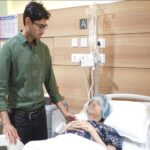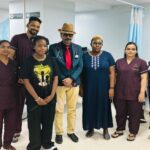healthy soch
Cox’s Bazar, Bangladesh, December 11, 2019:
Over 635,000 Rohingya refugees and Bangladeshi host community will be vaccinated against cholera in a 3-week-long campaign beginning today at the refugee camps in Cox’s Bazar and nearby areas, to protect vulnerable population against the deadly disease amidst increasing number of cases of acute watery diarrhoea (AWD).
The Oral Cholera Vaccination (OCV) campaign will be implemented in the refugee camps from 8-14 December to reach 139,888 Rohingya aged 1 year and less than 5 years. In the host community, the campaign will take place from 8-31 December and aims to reach any person older than 1 year (495,197). In total, 635,085 people are expected to be reached.
Led by the Ministry of Health and Family Welfare, with support of the World Health Organization (WHO), UNICEF and other partners, the campaign aims to reach people who missed some or all previous cholera vaccination opportunities. The campaign, including operational costs, is funded by Gavi, the Vaccine Alliance.
“We want to equip these populations with more protection against diarrheal diseases. Despite the progresses made to ensure access to quality water and sanitation, such diseases remain an issue of concern: approximately 80% of host community living near the camps have not been targeted in previous OCV campaigns and are still vulnerable”, says Dr Bardan Jung Rana, WHO Representative in Bangladesh.
Earlier rounds of cholera vaccination, which have taken place since the beginning of the emergency response in 2017, have helped prevent outbreaks of the disease. To this date, over 1 million people were vaccinated against cholera.
“UNICEF has been supporting a network of Diarrhoea Treatment Centres to provide critical treatment for those suffering with acute watery diarrhoea, which can be deadly if left unchecked. It is also vital to engage community health workers to promote good hygiene practices and combat diarrhoea at household level,” says Tomoo Hozumi, Representative, UNICEF Bangladesh.”
“No one, particularly children, should be denied the right to good health, including access to life-saving vaccines,” says Anuradha Gupta, Deputy CEO of Gavi, the Vaccine Alliance. “This is why we have been supporting immunisation activities in Cox’s Bazar since 2017, and why we will continue to work closely with partners to protect against cholera, prevent outbreaks and ensure no one is left behind.”
Over 1450 teams, comprising 4300 volunteers including Community Health Workers (CHW), will be conducting house to house vaccinations. Additionally, 240 supervisors and 68 OCV camp coordinators will support the campaign in the camps, and 15 supervisors and 30 team supervisors will do the same in the host community.
The campaign will be monitored by all partners: Ministry of Health & Family Welfare (MOHFW), Office of the Refugee Relief & Repatriation Commissioner (RRRC), WHO, UNICEF, UNHCR, International Centre for Diarrhoeal Disease Research (iccdr,b) and other partners to ensure quality in the camps and host communities.
“The Government is committed to take all possible measures to keep this deadly disease at bay. Continuing efforts are being made with the support of UNICEF to improve access to clean water and sanitation and promote hygiene – both critical measures to control the transmission of cholera and other waterborne diseases. UNICEF and its partners have been at the forefront of efforts to improve the ability of health workers to combat diarrhoea.” says Professor Dr. Abul Kalam Azad, Director General of Health Services (DGHS), Ministry of Health and Family Welfare, Government of Bangladesh.
The World Health Organization is keeping a close watch on the cases of AWD through the Early Warning, and Emergency Surveillance System (EWARS), which includes monitoring of diseases being reported to the health facilities. Additionally, WHO is supporting monitoring of water quality and is enhancing laboratory capacity of the Department of Public Health Engineering.
Both WHO and UNICEF have prepositioned life-saving medical supplies to ensure a rapid response to any cholera outbreak.
All OCV doses are taken from the global cholera vaccine stockpile, which is funded by GAVI. The use of the stockpile for outbreak response is managed by the International Coordinating Group (ICG), which features representatives from WHO, UNICEF, IFRC and MSF. Since the stockpile was launched in 2013, millions of doses every year have helped tackle outbreaks across the globe, including campaigns in Cox’s Bazar.
healthysoch







